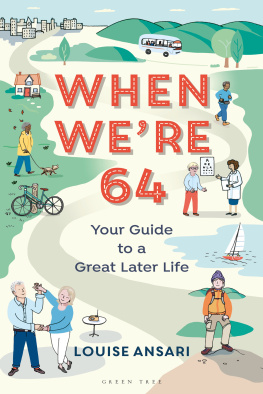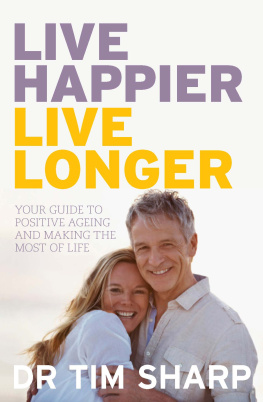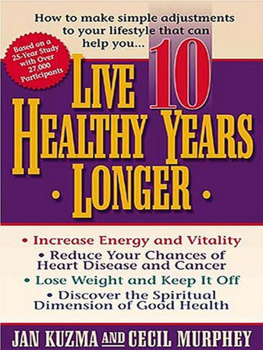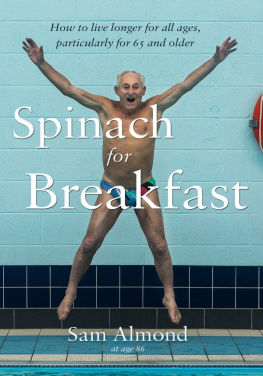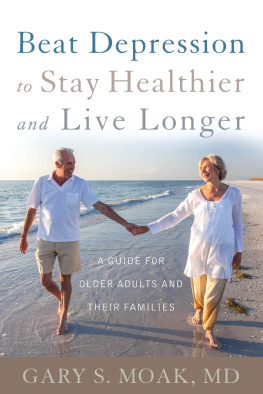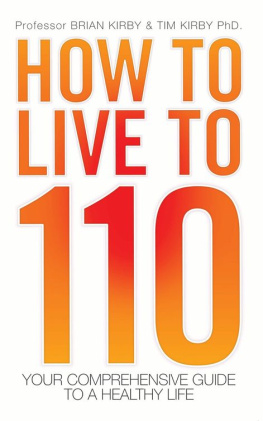
To all my wonderful colleagues
and to Karen Ageing Better together!

Contents
An enormous thanks to the following people for contributions, corrections, advice and stories (listed in chapter order):
Hannah Swift, University of Kent
Guy Robertson, Positive Ageing Associates
Michelle Cracknell, Pensions Advisory Service
Hannah Mills, Lorraine Charlton and colleagues from Citizens Advice
The Transitions in Later Life learning community and the Calouste Gulbenkian Foundation UK
Alyson Bowcott and Legal and General
Shaun Delaney, NCVO
Dr Thomas Bak, University of Edinburgh
Alison Cox, Cancer Research UK
Felicity Barr and Diabetes UK
Alison Tedstone, Public Health England
Kate Sheehan, the Occupational Therapy Service
Alex Fox, Shared Lives Plus
Alison Armstrong, Whiteley Village
Chris Sherwood, Relate
Laura Alcock-Ferguson, Campaign to End Loneliness
Emily Holzhausen, Carers UK
Julia Whittaker, humanist celebrant
Felicity Warner, Soul Midwife
Christopher Jenkins
Many individuals who agreed to talk to me or allow me to use their stories, including Nora Doleman, Bob Dunkerley, Pat Scully, Liz Clutterbuck, Peggy Ruff, and many others who spoke anonymously, whose words I hope will inspire others.
All the staff at the Centre for Ageing Better, particularly Amy McSweeney, who provided invaluable research support, Jess Kuehne and Luke Price for fact-checking; and all the Trustees, particularly Mark Hesketh for his contribution on the finances chapter.
This book is going to help you get ready for a major adventure. You are likely to live longer than you think and I can tell you now, youre not prepared for it. Youre not prepared to make it the happiest time of your life. You might have thought about one or two elements your pension, perhaps, or getting a bit fitter but theres much more to consider. Not sure where to start? Help is at hand. By the end of this book youll have the knowledge, tips and pointers to think very differently about the amazing opportunity that a long life can bring
For those of you who like shortcuts, let me reveal the 10 things that you should do now to make sure you prepare to have a great later life. Some of them will surprise you. The rest of this book provides the detail of how to get there. It includes advice on how to change the way you think about the challenges life throws at you, and has lots of practical guidance on subjects ranging from choosing where to live, to how to make sure youll be financially secure, and much more in between.
So, what are the keys to a great later life?
1. Keep working
You might think older age is all about retirement and a life of leisure. But people want meaning and purpose in their life and, more often than not, work is something that means you can use your brain (or brawn!), connect with others, and obviously it provides a source of income. Its not for everyone and the work has to be a good, flexible job that suits you but continuing to work if you can is a really good thing.
2. Stand on one leg
Silly? No. We all know were supposed to get off the sofa and go jogging and doing some brisk aerobic activity (75 minutes a week of being breathless, or 150 minutes of moderate activity including fast walking) is a must-do. But one of the keys to a great later life is keeping strength in your muscles and a good ability to balance. Strength and balance are the largely unknown and ignored bits of activity advice for adults. Few people understand their importance, but our strength and balance rapidly decline after the age of 40 and keeping them up could make all the difference between being independent or not when youre older, including reducing the risk of falling.
3. Dont smoke
We all know this one. Or do we? It might be a surprise to learn that 1.3 million people over 60 still smoke in the UK. Smoking causes cancer of the lung, bowel and bladder, and 78,000 people died of smoking-related disease in 2016. Lots of help is available to quit, and vaping is likely to be a good way to wean yourself off cigarettes.
4. Lose weight
What a presumption! I say lose weight because the majority of us are overweight a shocking 33.3 million people in the UK (thats more than 60 per cent of the population, up from 52 per cent 25 years ago). You might be one of the people who manages to stay at the right point on the body mass index and not have to buy the largest size in the clothes shop, but most of us are not in that happy position. And it does take more conscious effort as we age, as the metabolism slows. Obesity and being overweight leads to Type 2 diabetes, heart disease and an increased risk of several cancers. We know that drinking too much booze can also be harmful, as well as adding calories. So, make the effort and try and lose the extra inches now.
5. Share the love
Making time to help others, from formal volunteering roles like helping at a hospice or fundraising for your favourite charity to just simple things like putting the neighbours bins out when theyre away, has proven benefits for you as well as the people youre helping. Volunteering or contributing in other ways to the community you live in can give the great feeling that youre giving back but it really is a win-win activity that can add structure and interest to your own life, as well as getting to know new people and learning something new.
6. Be creative
Life isnt all work, of course, however much you might enjoy it (if you do!). Your time in later life will be a great gift, so cultivate yourself, your creativity, your hobbies the things that make you especially you now. Some people in retirement do what has been called the grab trying out a hundred new hobbies and volunteering for everything. If you already know what you enjoy, including learning new things and being creative (bonsai cultivation anyone?), then this will stand you in good stead for a pleasurable use of free time when youre older.
7. Know your place
Are you at home now? Have you thought about whether or not you want to stay in your flat or house as you grow older? If you do, is it going to be right for your needs in terms of space, accessibility and ease of use, and is it in the neighbourhood you want to love in later life? These are serious questions that many people dont think ahead on. Eighty per cent of people aged 65 and over tell us they want to stay in their own home as they grow older, but so many homes arent fit for purpose. If you want to stay, or move, make that choice a deliberate one, taking into account any future-proofing that your current home needs, or finding the right home in the right place for your needs as you age.
8. Be positive
One foot in the grave style grumpiness is out of fashion now we know how a negative attitude to growing old could actually take years off your life. Being downbeat and having a consistently unhappy approach has been associated with a reduction in lifespan of around seven years. Im not suggesting constant fake smiles, but positivity can help you deal with the slings and arrows of outrageous fortune, as well as keep you healthy physically and mentally from day to day.
9. Save more
If you carry on working, or get back into it if youve left for health reasons or have retired already, this is obviously a good source of income. But saving into a pension, whether it be workplace or private, is absolutely crucial for your financial health as you grow older. Until auto-enrolment (mandatory workplace pensions), 38 per cent of eligible employees had no occupational pension. But with state pension age getting later, and potentially providing you with less income than youd like or need, saving more is an absolute must in middle age. While the majority of pensioners are in receipt of some state pension, more than ever are supplementing this with private pension income. In 1994, 59 per cent had some private pension benefits. By 2017, this had reached 71 per cent of all pensioners, with only 30 per cent having just the state pension and means-tested benefits to rely on.

